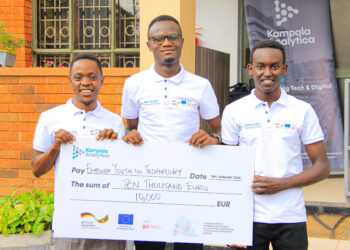

The 9th CAMTech Uganda Annual MedTech Hack-a-thon brought together innovators from around the world to tackle the most critical health challenges in low-resource settings. This year’s Hack-a-thon, hosted by the prestigious Mbarara University of Science and Technology (MUST) and CamTech Uganda, was organized under the theme “Leveraging Innovation to Achieve Equitable and Sustainable Healthcare.” The hackathon was graced by the State Minister of ICT and National Guidance, Hon. Kabbyanga Godfrey Baluku and Prof. William Bazeyo who is the
As the participants from diverse backgrounds and cultures converged at MUST, the excitement in the air was palpable. They had gathered to harness their creativity and expertise to address critical health issues that disproportionately affects underserved communities.
The theme for this year’s event was particularly timely, given the ongoing global healthcare disparities. The organizers believed that through innovation and collaboration, they can bring hope and change to those in dire need.
In alignment with the overarching theme, the organizers introduced four specific focus areas for the hack-a-thon:
- Non-Communicable Diseases (NCDs): NCDs, such as diabetes, cardiovascular diseases, and cancer, were wreaking havoc in low-resource settings. Innovators at the hack-a-thon were challenged to create solutions that would help diagnose, monitor, and manage these diseases effectively, even in the most remote areas.
- Emerging and Re-emerging Pandemics: The COVID-19 pandemic had exposed the vulnerabilities in healthcare systems worldwide. Participants were tasked with devising innovative tools and strategies to respond swiftly to emerging pandemics while ensuring the continuity of essential healthcare services.
- Road Traffic Accidents: Road traffic accidents were a leading cause of injury and death in many low-resource settings. Innovators were encouraged to develop technologies that could reduce accidents, improve emergency response, and enhance post-accident care.
- Mental Health: The mental health crisis, often overlooked in resource-constrained areas, was a major concern. Participants were challenged to create accessible and culturally sensitive solutions to address mental health issues, including depression, anxiety, and trauma.
The hack-a-thon commenced with a series of inspirational talks by healthcare leaders, innovators, and local community members who had experienced the impact of previous CAMTech innovations. The stories of people whose lives have been transformed through technology.
Throughout the event, interdisciplinary teams of engineers, doctors, designers, and community advocates collaborated tirelessly. They brainstormed, sketched, prototyped, and tested their ideas, with one common goal: to make healthcare more equitable and sustainable.
As the final day approached, the teams presented their innovations. There were apps for early NCD detection, telemedicine solutions to bridge the gap in mental health services, and sensor-based devices to prevent road traffic accidents. Each presentation demonstrated a deep commitment to the theme of equitable and sustainable healthcare.
The judges had the unenviable task of selecting the winning teams for the pitching exercise. Their decisions were influenced not only by the technical ingenuity but also by the potential impact on communities in need. The winners for the this years Hack-a-thon are as follows:
- Mama Wear emerged as the overall winner. The solution aims to detect breast cancer at an early stage.
- Breath Tracker emerged as the first runners up. Their solution is aimed at early detection of asthma attacks to minimize death resulting from abrupt attacks.
- Eco Detect emerged as the second runners up. The solution seeks to detect high concentrations of arsenic in food stuffs especially rice.


In the end, every participant was a winner, knowing that their hard work and innovation would contribute to making the world a better place.
The 9th CAMTech Uganda Annual MedTech Hack-a-thon left a lasting legacy. It demonstrated the power of innovation to address the most pressing health challenges in low-resource settings. It also highlighted the incredible spirit of collaboration that united people from different corners of the world.
The event’s impact extended far beyond the boundaries of Mbarara. The innovations and ideas generated during the hack-a-thon can be taken forward, refined, and implemented, reaching those who needed them the most. As participants dispersed, they carried with them not only memories of a transformative event but also a shared commitment to achieving equitable and sustainable healthcare worldwide.









